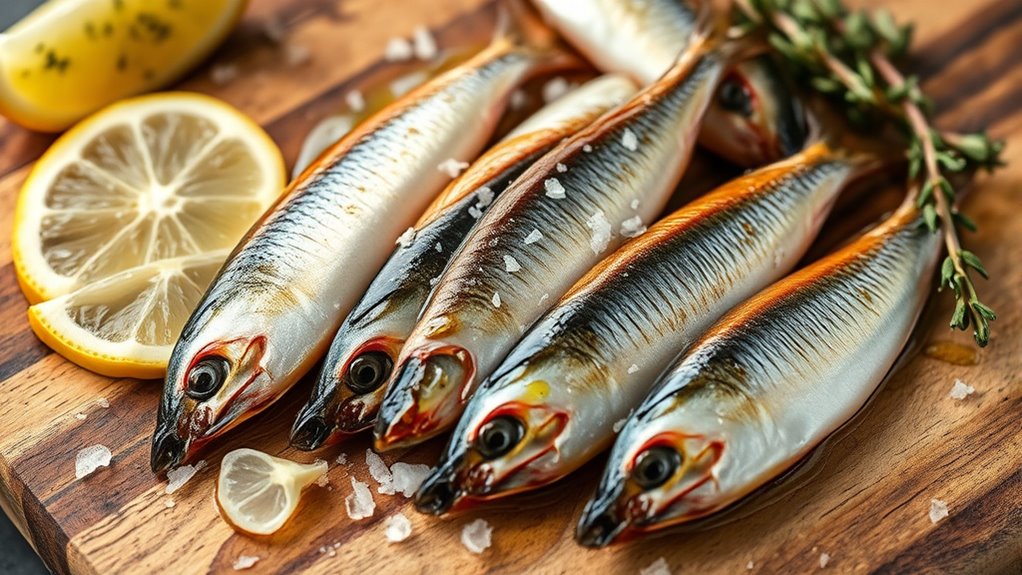Anchovies are tiny fish packed with umami, the fifth fundamental flavor that enhances richness and depth. When fermented, they release glutamate and other compounds that boost savory flavors, making dishes taste more complex and satisfying. Adding anchovies creates a flavor synergy that elevates sauces, dressings, and stews without overpowering other ingredients. If you want to understand how this tiny ingredient makes everything taste better, you’ll find fascinating insights ahead.
Key Takeaways
- Anchovies are rich in glutamate, which enhances savory umami flavor in dishes.
- Fermentation concentrates umami compounds, making anchovies more flavorful and complex.
- Small amounts of anchovies activate flavor synergy, amplifying other ingredients’ tastes.
- The natural fermentation process develops savory depth without artificial additives.
- Anchovies serve as umami bombs, transforming simple dishes into rich, satisfying flavors.

Have you ever wondered why certain dishes taste so irresistibly savory? The secret often lies in the magic of umami, the fifth flavor that enhances the depth and richness of your meals. Anchovies are a prime example of how this flavor can transform a simple dish into something extraordinary. At the heart of their power is the science behind fermentation techniques, which releases complex flavors and amplifies the natural umami compounds found in these small fish. When anchovies undergo fermentation, enzymes break down proteins into amino acids like glutamate, which is responsible for that savory, mouthwatering taste. This process creates a concentrated umami punch that, when added to dishes, brings a flavor synergy that’s both harmonious and compelling.
Fermentation releases umami compounds in anchovies, transforming simple ingredients into deeply savory, flavor-rich additions.
As you incorporate anchovies into your recipes, you’re not just adding salt; you’re tapping into a sophisticated flavor profile that enhances the overall dish. The fermentation techniques used to process anchovies intensify their savory qualities, making them more than just a salty ingredient. Instead, they become a source of deep, layered complexity that complements other flavors. This is why anchovies work so well in sauces, dressings, and stews—they don’t overwhelm but instead elevate the natural ingredients, creating a balanced, umami-rich experience.
Understanding the science behind fermentation and flavor synergy allows you to appreciate why anchovies are such a powerful ingredient. When you add a small amount, you’re not just seasoning; you’re activating a chemical harmony that enhances other tastes. The amino acids released during fermentation interact with aromatic compounds, creating a savory richness that’s both subtle and profound. This synergy is why dishes like Caesar salad or puttanesca taste so deeply satisfying—they rely heavily on the umami boost that anchovies provide.
Moreover, the beauty of fermentation techniques is that they are natural and time-honored. They transform humble fish into a flavor powerhouse without artificial additives. Refrigeration cycle techniques are crucial in controlling fermentation processes, ensuring the quality and safety of anchovies. By mastering these methods, you can craft your own umami bombs, elevating everyday cooking into a gourmet experience. When you understand the role of fermentation in developing umami, you see anchovies not just as a salty topping, but as a fundamental ingredient that brings a complex, savory depth to your meals. It’s this combination of science and culinary artistry that makes anchovies truly special—an ingredient that makes everything taste better through pure flavor synergy.
Frequently Asked Questions
Can Anchovies Be Used as a Vegetarian Umami Substitute?
You might wonder if anchovies can be a vegetarian umami substitute. While anchovies are animal-based, plant-based umami options like mushroom extracts are great alternatives. You can boost flavor using soy sauce, miso, or nutritional yeast too. These options provide the savory depth you’re seeking without fish. So, if you’re avoiding animal products, try mushroom extracts or other plant-based sources to achieve that rich umami taste in your dishes.
How Long Do Anchovies Stay Fresh in the Refrigerator?
You can keep anchovies in your refrigerator for about 1 to 2 weeks, depending on how fresh they are when purchased. Check the storage duration regularly, and look for spoilage signs like a sour smell, slimy texture, or discoloration. To maximize freshness, store anchovies in an airtight container submerged in oil or brine. If any spoilage signs appear, discard them to avoid foodborne illnesses.
Are There Health Risks Associated With Consuming Anchovies Regularly?
Imagine anchovies as tiny flavor rockets that pack a punch—yet, like anything powerful, they have risks. Eating them regularly can expose you to mercury build-up, which may affect your health over time. Also, if you’re allergy-prone, beware of potential allergy concerns. Moderation is your best friend; enjoy anchovies for their umami magic, but keep an eye on mercury levels and watch for allergy signs to stay safe.
What Are Some Vegan Alternatives to Anchovies for Umami Flavor?
If you’re looking for vegan alternatives to anchovies for that umami kick, you can try plant-based options. Mushroom alternatives, like shiitake or dried porcini, are excellent because they naturally offer rich umami flavor. You might also consider seaweed or fermented foods like miso and soy sauce. These options provide that savory depth you’re craving without using animal products, making your dishes flavorful and cruelty-free.
How Does the Sodium Content in Anchovies Affect Health?
Think of sodium as a double-edged sword; it can enhance flavor but also threaten your well-being. Consuming too much sodium intake from anchovies may lead to increased blood pressure, putting your cardiovascular health at risk. Moderation is key, so enjoy anchovies sparingly. Keeping sodium levels in check helps protect your heart and maintains overall health, ensuring you savor flavors without unintended consequences.
Conclusion
You might be surprised to learn that just a small amount of anchovies can boost a dish’s umami flavor by up to 40%. This tiny ingredient acts like a flavor amplifier, making everything taste richer and more satisfying. Next time you cook, remember that adding anchovies isn’t about overpowering—it’s about enhancing. So go ahead, embrace these umami bombs and transform your meals into savory, mouthwatering experiences that keep everyone coming back for more.










